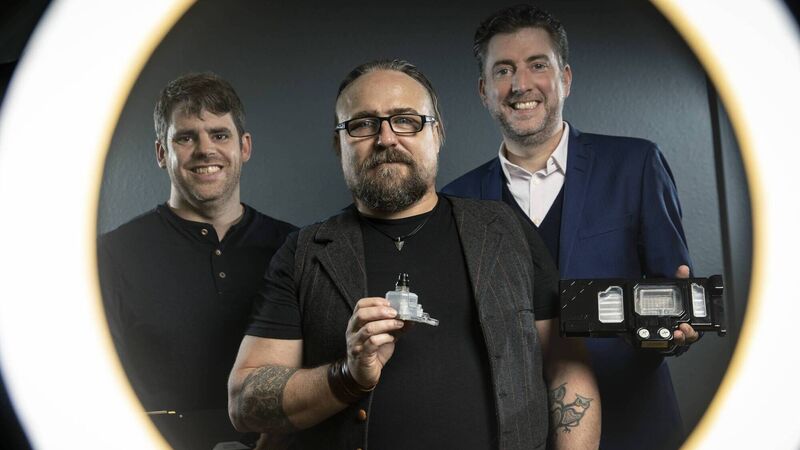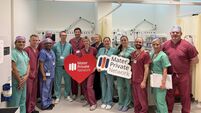Cork firm pioneers cooling solution that can transform waste heat into energy

Co-founder and chief operating Officer, Dr Cathal Wilson; co-founder and chief science officer, Prof. Anthony Robinson and co-founder and chief executive officer, Kenneth O'Mahony at the launch of Nexalus.
IRELAND is Europe’s largest data centre market, with 66 active data centres and 29 currently in development. Dublin alone is home to four of the leading five hyperscalers.
The ICT sector supports more than 100,000 direct and indirect jobs, with compute services our largest export sector, beating Pharma and Agrifood. While this is all very positive for Ireland, there is one growing elephant in the room – Carbon emissions and electrical consumption.
With increasing pressure on industry and the Irish government to reduce their CO2 emissions, Irish science and engineering company Nexalus has developed a pioneering green energy solution that can turn one of the fastest-growing contributors of CO2 emissions to Carbon neutral or net contributors to the Irish energy circle.
Founded in Cork, with international strategic development and manufacturing partners, Nexalus is a leading provider of sustainable electronic cooling solutions, with patented technology that prioritises not only performance and profit but also the planet. A key goal is to enable industries to reach and exceed both their economic and environmental targets simultaneously - turning heavy electrical energy users, like data centres, into organisations that are generating clean energy. This is achieved with a zero-compromise approach to performance.
With its foundation firmly rooted in both science and engineering, Nexalus set out to explore the thermal issues affecting the market, namely ‘heat problems’ and ‘energy problems’, and to utilise the untapped ‘greener’ potential of this ever-growing industry.
Combining applied thermodynamics with clever thermal-fluid science and engineering, Nexalus systems integrate with electronics that produce excessive heat, to cool, capture and reuse this thermal energy, while also increasing efficiency and reducing costs. Nexalus’ ability to not only recover but to convert this otherwise waste heat into a clean energy asset, creates the perfect circular economy.
Currently data centres in Ireland waste circa 3.0TWhrs of energy annually.
However, a 20MW data centre that implements a Nexalus hot-water cooling system will[2]:
Reduce energy consumption by circa 35%, giving a PUE of 1.04 & resulting in an electrical consumption cost saving of over €5.5million annually [1] Increase server/compute density 3x to 10x Reduce CO2e emissions by circa 23,000 tonnes[2] Increase Energy Reuse Factor (ERF) by up to 90% Generate a new clean energy resource in the form of heat & hot water for 6,000 domestic homes annually[3] Create a new revenue stream, from the sale of this green energy to district heating or neighbouring businesses and industry, of circa €4 million annually[4] Off-set an additional 24,000 tonnes of CO2e in the homes receiving this new green energy[5] Co-Founder and Chief Science Officer, Prof. Anthony Robinson says: “When developing technology for data centres we had to consider the multiple heat problems which arise from thousands of powerful servers all operating under one roof, while also tackling heat capture and reuse. Our technology allows data centres to solve these problems simultaneously by integrating liquid cooling directly into ‘sealed server’ technology. In sealing the server and then dealing with the heat and energy management problems at the source, the larger energy problem becomes modular - and thus scalable - and more of an energy transport issue, which is comparatively straightforward to solve.” With the Nexalus Combined Heat & Compute (CHC) data centre technology, each server is thermally isolated from its surroundings, and heat is recovered from the high-powered processors via a patented jet impingement Enflux/Vortex (CPU/GPU) water-cooled direct contact heat exchangers.
All of the lower-powered supporting electronic components, RAM, VRM, power supplies and storage etc. are air-cooled with the Nexalus NXQ air-water heat exchanger, which itself is a heat recovery device embedded in the server. This means that all of the heat generated within the sealed server can now be recovered into a liquid stream, which can be easily transported for use elsewhere.
As a result, Nexalus view data centres not just as hubs for processing data, but as thermal power stations. For example, a Central Processing Unit (CPU), is extremely effective at converting electrical energy into thermal energy, due to its favourable electrical and thermal properties. Nexalus patented technology can lift the thermal energy at a water temperature suitable for reuse - between 40°C to 60°C. - which means that the historically wasted CPU thermal output can be redeployed to residential, industrial and food production sectors which, in turn, displaces the use of fossil fuels.
If all Irish data centres were to implement Nexalus hot-water cooling technology, new green energy could be generated which would provide hot water and heating to over 300,000 homes annually, that’s 15% of all Irish homes. CO2e emissions would be offset by over 1.2million tonnes of Carbon, which is 19% of Ireland’s 6.5million climate action target for 2030.
While other cooling companies are starting to explore energy recovery, Nexalus are the first to market, globally, with heat recovery and reuse solution which is practical, adaptable to various environments and can be implemented easily at scale, without the requirement for complicated additional infrastructure.
Additional comment from Co-Founder and Chief Science Officer, Prof. Anthony Robinson: “At Nexalus, we are one of few companies that are innovating in the space where heat and energy problems are viewed as one. Having the capacity to develop technologies that exist at both ends, as well as bridging between them, is where our Nexalus innovations happen.
“The importance of modularity cannot be stressed enough. Being pluggable and hot-swappable not only allows for ease of installation and maintenance but facilitates economies of scale. Our solution, therefore, is equally viable for a single rack in a hotel as it is for a mobile cryptocurrency container or a hyperscale data centre. This itself then creates an equally scalable and broad energy market, where the heat, being at temperatures ideal for comfort, space and process heating, can be deployed into the likes of residential, industrial and food production sectors, which displaces the use of fossil fuels and accompanied generation of greenhouse gas emissions.” This new technology is not air-cooling, and it is also not liquid cooling in the form of immersion. Nexalus has pursued and achieved an elegance born from a true appreciation and understanding of thermal science with their hot-water cooling offering. Data Centres are not the only space in which Nexalus operates, their systems also marry perfectly with High Performing Computing (HPC), Bitcoin, Gaming and Automotive.
Nexalus emerged from blue skies/platform research in the CONNECT SFI research centre in Trinity College Dublin and is supported by Enterprise Ireland. For more information about Nexalus and their cool, capture and reuse electronic cooling solutions visit www.nexalus.com. You can also follow Nexalus online on LinkedIn or Twitter @NexalusCooling for product updates and further developments.







 App?
App?




